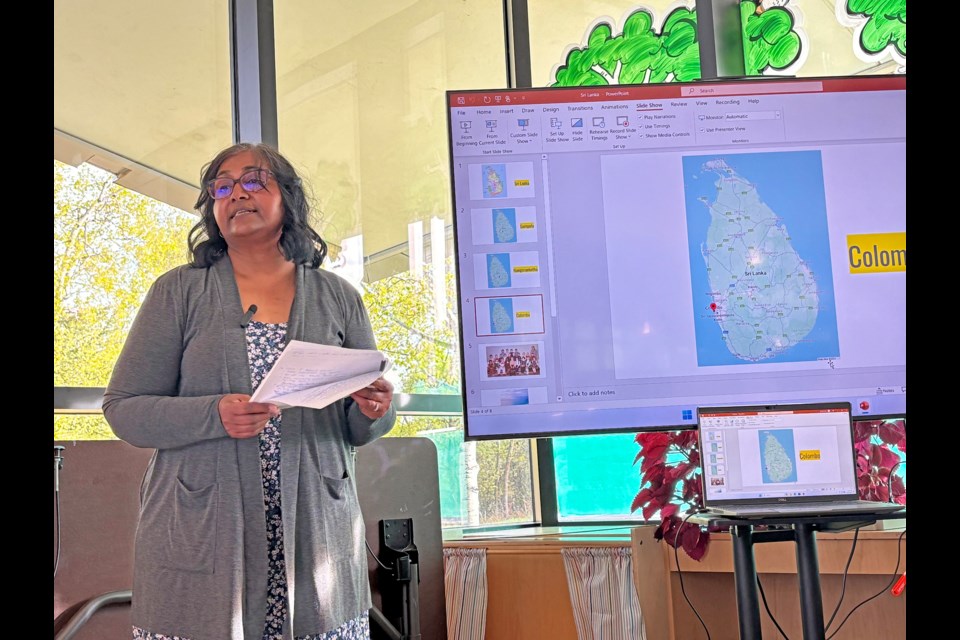INNISFAIL – When Bill Hoppins introduced Sue Haddow to an attentive crowd at the Innisfail Public Library he emphasized she was a citizen who represented many things about the community from different angles and levels.
“And I think it's wonderful because it is a little bit scary for her too,” said Hoppins.
Haddow smiled and made direct eye contact at the crowd, and thanked everyone for coming.
“I’m kind of overwhelmed at seeing all the faces but I also appreciate that they are all friendly faces,” she said.
On May 15 Haddow was the inaugural presenter for the new Human Library Program; People have Stories; a program that has found success in other municipalities by having citizens sharing their stories of arriving and living in their new communities.
The Innisfail program, which will be presented once a month with a new speaker, was created in partnership between the Innisfail Public Library and the Innisfail Welcoming and Inclusive Community Committee (IWICC).
“Story-sharing has the possibility of being the building block of connecting individuals, increasing understanding of our culture and community, and increasing our capacity to dialogue about important issues,” said Hoppins, the event moderator, to the crowd on May 15.
“It may also help us to identify talents within our community that can be used for the benefit of the common good.”
Haddow’s story since arriving in Innisfail from Sri Lanka in 1969 as a four-year-old child with her parents has been one of wonder, heartbreak and ultimate triumph.
She is a woman of colour who proudly began her story with a short bio.
“I am a Sri Lankan-Canadian. I’m a first-generation immigrant. I’m a social worker, and most importantly I am a wife, a mother and a step-mother. How did I get here?" she told the audience. “Let's start with my parents. I wouldn't be here at all if it weren’t for them.”
For the next 45 minutes, she offered her audience of more than 35 attentive citizens and family members her remarkable story, one that underscored perseverance, strength and hope.
Both her parents were well-educated and had dreams, including immigrating to Canada.
But they were of different religions – Christian and Buddhist.
When Haddow’s mother accepted a marriage proposal from her dad she was disowned by her parents and all siblings.
They went ahead with their marriage and were soon in Canada, first Manitoba and then Innisfail to work in the old Innisfail hospital.
When Haddow was five-years-old she was in a kindergarten class in the basement of John Wilson Elementary School.
“And I cried every day. But once I settled in I loved school,” said Haddow.
“I was told I was a clever little girl. I could speak multiple languages. I could read early, I love books, and I love to learn. I had exceptional teachers in elementary school, and I enjoyed going to school playing with other kids.
“And I felt like I belonged.”
However, that sense of belonging during her childhood only lasted until Grade 5.
“That was the point in my life where I started to recognize that I was different,” said Haddow.
She was the only female of colour from kindergarten to Grade 12. There were times when she was excluded. There were horrible racist epitaphs tossed her way.
“I wanted to be invisible. I hated being different. And I lost confidence and motivation in school,” she said.
But she did find friends in Innisfail who always had her back, ones who never looked down on her, or judged or excluded her.
In fact, Haddow pointed to a middle-aged woman in the audience named Barb.
“We have known each other since kindergarten,” Haddow told her audience.
And then there was the late Ted Webster, her principal at Innisfail Junior Senior High School.
“That man was always in my face. He demanded respect. He was also kind, sincere and genuine. Ted made me his business and he knew when I was struggling,” said Haddow. “I would just cringe at being noticed by everybody.
“He would ask me how things were going, and then send me off to class. He was letting me know that he cared about me. Ted came to my aid more than once during those tough years.”
But Haddow’s years did get better.
And despite additional challenges she went on to both college and university to earn a social work diploma and degree.
“When I went to the University of Calgary, it was when I first truly started to feel at ease in my skin,” she said. “There were so many students and teachers of different cultures races. I felt accepted.
“I know that nobody makes it through school, or life without challenges, disappointments, trauma, and the cycle of ups and downs. That's just a part of life that no one is exempt from.”
Today she is a successful professional woman, mother, wife and a respected community builder in Innisfail who has been an influential force with the town’s IWICC and community safety committees.
And she is happy and loved by family, friends and colleagues. Haddow has found that acceptance is the key, and there is no longer a need to ever again feel invisible.
“The colour of my skin has always been and will always be a huge part of my identity. It is still the first thing people will notice about me,” she said.
“But I've had to change my thinking and have learned that my value doesn't decrease just because someone else can't see my worth.”



